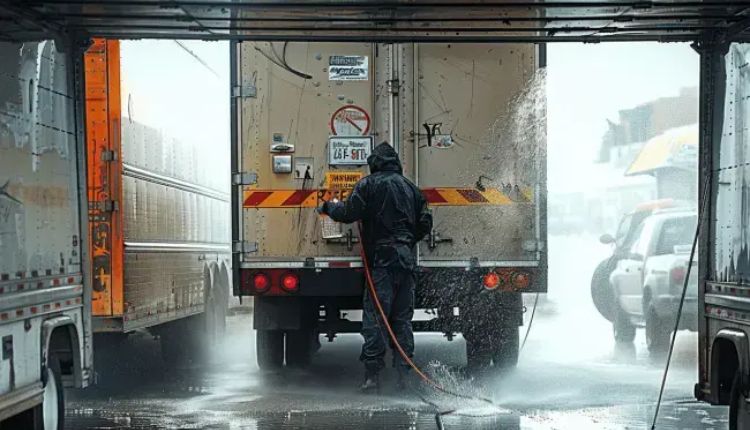When you’re spending long hours on the road, it’s easy to overlook minor details. But if you’re hauling sensitive freight, one of those “little things” could shut down your entire schedule. We’re talking about trailer washouts.
They don’t get much attention until they’re suddenly the reason you’re stuck at a dock, losing time and revenue. Whether you run dry van, reefer, or even flatbed, knowing when and where to get your trailer cleaned can save you from rejections, load delays, and even DOT trouble.
Let’s clear up what a trailer washout really involves and why it’s an essential step that many experienced truck drivers don’t skip.
Why a Clean Trailer Isn’t Just About Appearances
A clean trailer isn’t just for looks. In many situations, it plays a big role in food safety, compliance with regulations, and making sure your next load stays protected.
Trailers that haul food products, pharmaceuticals, or livestock are subject to cleanliness standards under regulations like the FDA’s Food Safety Modernization Act (FSMA). Even small residues from meat or produce can cause bacterial contamination that may affect thousands of dollars in goods.
Brokers and shippers are getting stricter. A 2024 industry survey from Food Logistics found that over 70% of food shippers now require washout documentation before loading. If that slip is missing, many won’t even let you into the dock area.
What a Trailer Washout Includes
Some locations offer only a basic rinse, while others follow a full step-by-step sanitation process that meets food-grade or reefer standards.
Here’s what a professional trailer washout near me typically involves:
- Pressure washing to remove visible debris.
- Application of degreasers or antibacterial solutions (when needed).
- Targeted cleaning of corners, walls, and underfloor rails.
- A final rinse with clean water.
- Drying or ventilation, especially for reefer trailers.
Facilities that clean trailers hauling animal products often use approved sanitizers that align with USDA standards. This matters when switching between types of freight, for example, from frozen meats to dry goods.
When You’re Expected to Get a Washout
Knowing when a washout is required can help avoid unnecessary stops or load rejections. Based on carrier rules and broker requirements, here are the most common situations that call for a washout:
- After hauling meat, poultry, dairy, or any kind of liquid product.
- When switching between reefer and dry freight.
- After carrying mulch, absorbents, or anything with strong odors.
- If cargo spilled, leaked, or left residue in the trailer.
- When a broker or shipper includes it in the rate confirmation.
In general, if the freight is perishable, sensitive, or has strict safety requirements, a clean trailer is non-negotiable. Some brokers will verify this by checking timestamps on the washout receipt to ensure it was done recently.
What Happens If You Skip Washing a Trailer
Skipping a required washout can turn into more than just a minor problem. It can impact your delivery window, broker relationships, and even DOT compliance.
Here’s what drivers have reported:
- Being turned away at the docks because of visible dirt or smell.
- Loads canceled on-site due to sanitation issues.
- Freight claims filed after odor or residue ruined sensitive cargo.
DOT inspections were triggered by complaints of unsanitary trailers. - Missed reloads or payment reductions from brokers.
In one documented case, a reefer driver carrying seafood without a prior washout caused a full trailer rejection due to leftover odors from the previous load (onions). That five-minute delay turned into a lost load worth $4,800.
Finding the Right Washout Facility
Not all truck washes are equipped for trailer cleaning. If you need a proper washout, especially for food-grade freight, it’s worth being selective.
Here’s what to look for when choosing a washout facility:
- Food-grade certification, if required by your load.
- Hot water pressure systems or chemical treatment options.
- Trailer washout receipts must clearly state both the trailer number and the time of service.
- Digital or printable documentation is accepted by brokers..
- Extended hours that align with your pickup times.
If you’re looking for a trailer washout in Houston, TX, there are plenty of options, but not all of them meet professional standards. Some offer only basic rinses, while others are equipped for full food-grade sanitation with faster turnaround times.
Apps like Trucker Guide can help confirm whether a location offers trailer washouts. Google Reviews and other driver platforms also provide insight into service quality and wait times.
How Much Does It Cost to Wash Out a Trailer?
Trailer washout costs typically fall between $40 and $90. This price can vary based on the cleaning facility, the kind of trailer, and how thorough the cleaning needs to be. Some locations offer food-grade or hazmat cleaning for an additional fee.
In many cases, brokers or shippers will reimburse the washout cost if it’s listed on the rate confirmation. Remember to always keep the receipt and photograph it for your records. If you’re running a reefer or high-value load, brokers often require the washout to have occurred within 24 hours of pickup.
An empty trailer doesn’t mean you can forget the paperwork. That missing slip can delay your next load or your paycheck.
One Final Step That Makes a Big Difference
After a washout, don’t rush off too fast. Before you leave the facility, double-check the floor, corners, and ceiling panels. If there’s still standing water or leftover cleaner, you could be facing delays at your next dock.
Some drivers bring towels or battery-powered fans to help speed up drying. Others keep a flashlight on hand to inspect tight spaces that cleaning crews sometimes miss.
Taking five extra minutes to confirm your trailer is clean and dry can prevent hours of delay and awkward calls with dispatch.






